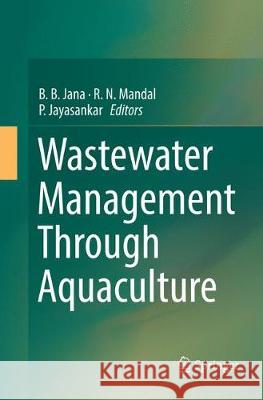Wastewater Management Through Aquaculture » książka



Wastewater Management Through Aquaculture
ISBN-13: 9789811356100 / Angielski / Miękka / 2018 / 335 str.
Wastewater Management Through Aquaculture
ISBN-13: 9789811356100 / Angielski / Miękka / 2018 / 335 str.
(netto: 845,42 VAT: 5%)
Najniższa cena z 30 dni: 848,19
ok. 16-18 dni roboczych.
Darmowa dostawa!
Part 1. Understanding the fundamentals of soil-water interactions and biogeochemical nutrient dynamics.- Chapter 1. Understanding the soil-water interactions for sustainable ecosystem services in aquatic environments.- Chapter 2. Biogeochecimal cycling bacteria and nutrient dynamics in waste stabilization pond system - Part 2. Culture practices of wastewater fed aquaculture.- Chapter 3. Global prospects for safe wastewater reuse through aquaculture.- Chapter 4. Waste system, its utility and analyses in aquaculture.- Chapter 5 Recycling of sewage in aquaculture: Decadal technical advancement.- Chapter 6. Wastewater fed aquaculture in East Kolkata wetlands: State-of- the- art and measures to protect biodiversity.- Chapter 7. Fish diseases in wastewater aquaculture and remedial measures.- Part 3. Strategies towards wastewater reclamation using green and sustainable technologies.- Chapter 8. Ecosystem resilient driven remediation for safe and sustainable reuse of municipal wastewater.- Chapter 9. Bioremediation of perturbed water bodies fed with wastewater for enhancing finfish and shellfish production.- Chapter 11. Recent technologies for wastewater treatment: a brief review.- Chapter 12. Adsorption technique for removal of heavy metals from water and possible application in wastewater fed aquaculture.- Part 4. Economic perspectives of wastewater, environmental impact assessment and environmental law and regulations.- Chapter 13. Multiple reuse of wastewater : Economic perspectives.- Chapter 14. Socio economic impacts and cost-benefit analysis of wastewater-fed aquaculture.- Chapter 15. Environmental impact assessment: a case study on east Kolkata wetlands.- Chapter 16. Law and regulation of wastes and wastewater: Indian perspectives.
Professor (Dr) B. B. Jana, a Fellow of National Academy of Agricultural Sciences, New Delhi as well as some other prestigious Academies in India and recipient of the Joy Govinda Memorial Award of the Asiatic Society, is Emeritus Fellow and Academic Advisor in the International Centre for Ecological Engineering, University of Kalyani, West Bengal India. He did his doctorate on aquatic ecology and microbiology and worked as Post Doctoral Fellow of the then USSR and DAAD Visiting Fellow in the University of Hamburg, Germany. He has published several monographs, books and contributed chapters in UNESCO-Encyclopedia and has published over 235 papers in peer reviewed journals and supervised 32 Ph. D students. As a Principal Investigator, he is the recipient of many national and international projects funded by European Commission, GTZ and TTZ, ICAR, UGC, CSIR, DST, DBT, DOEn and Govt. of India, etc. His domain of research includes wastewater aquaculture, ecological sanitation, eco-restoration, ecological engineering, microbial nutrient cycling, integrated organic farming, impact of global warming and climate change in aquaculture, water conservation, etc. A Board Member of the International Ecological Engineering Society, Switzerland and editorial board member of several important journals, Professor Jana has extensively travelled abroad and chaired and/or participated and invited speakers in many International conferences held in many countries of the world. At present, his passion is eco-sanitation particularly for the use of human urine as alternative chemical fertilizer. One of his papers published in Ecological Engineering has been highlighted in the News@Nature.com . His another current publications on human urine has also been highlighted and covered in IndoUS Business Journal Aug 28, 2016 which reads as: Now human urine as an organic alternative to chemical fertilizers. As a secretary, his mission has been focused on outreach programme and extension activities at the grass root level which are being implemented through his own founded NGO, KALYANI SHINE INDIA known as Centre for Environmental Protection & Human Resource Development aimed at alleviating rural poverty and protection and conservation of biodiversity, environment and water resources.
This volume provides state-of-the-art information on soil-water interactions in wastewater systems, characterization of wastewater, modes of treatment, safety of wastewater use, water conservation technologies involved in recycling of sewage in fish culture, biogeochemical cycling bacteria and nutrient dynamics, ecosystem resilient driven wastewater reclamation, bioremediation, aquaponics, ecological integrity, culture practices of fish farming, microbial food web phenomena, fish diseases, environmental economics of wastewater, environmental risk assessment, environmental law and regulations. Given its breadth of coverage, the book will be useful to researchers, teachers, students, administrators, planners, farmers and entrepreneurs interested in the profitable use of wastewater in the wastes-into-wealth framework of for the benefit of humanity, and in achieving the targets for sanitation and safe wastewater reuse by 2030, specified in the United Nations’ Sustainable Development Goals.
1997-2026 DolnySlask.com Agencja Internetowa
KrainaKsiazek.PL - Księgarnia Internetowa









